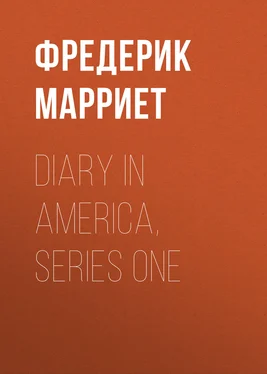Фредерик Марриет - Diary in America, Series One
Здесь есть возможность читать онлайн «Фредерик Марриет - Diary in America, Series One» — ознакомительный отрывок электронной книги совершенно бесплатно, а после прочтения отрывка купить полную версию. В некоторых случаях можно слушать аудио, скачать через торрент в формате fb2 и присутствует краткое содержание. Жанр: Путешествия и география, История, literature_19, foreign_edu, foreign_antique, foreign_prose, на английском языке. Описание произведения, (предисловие) а так же отзывы посетителей доступны на портале библиотеки ЛибКат.
- Название:Diary in America, Series One
- Автор:
- Жанр:
- Год:неизвестен
- ISBN:нет данных
- Рейтинг книги:3 / 5. Голосов: 1
-
Избранное:Добавить в избранное
- Отзывы:
-
Ваша оценка:
- 60
- 1
- 2
- 3
- 4
- 5
Diary in America, Series One: краткое содержание, описание и аннотация
Предлагаем к чтению аннотацию, описание, краткое содержание или предисловие (зависит от того, что написал сам автор книги «Diary in America, Series One»). Если вы не нашли необходимую информацию о книге — напишите в комментариях, мы постараемся отыскать её.
Diary in America, Series One — читать онлайн ознакомительный отрывок
Ниже представлен текст книги, разбитый по страницам. Система сохранения места последней прочитанной страницы, позволяет с удобством читать онлайн бесплатно книгу «Diary in America, Series One», без необходимости каждый раз заново искать на чём Вы остановились. Поставьте закладку, и сможете в любой момент перейти на страницу, на которой закончили чтение.
Интервал:
Закладка:
“The clumsy brute has half-killed the girl!—Don’t cry, my dear.”
“Pick up the child, Tom, and shove it out of the way.”
“Where shall I put her?”
“Oh, any where just now; put her on the turkey-coop.”
“Starboard!”
“I say, clap on, some of you he chaps, or else get out of the way.”
“Sailor, mind my band-box.”
“Starboard!”
“Starboard it is; steady so.”
Thus, with the trifling matter of maiming half-a-dozen children, upsetting two or three women, smashing the lids of a few trunks, and crushing some band-boxes as flat as a muffin, the good ship Quebec was at last fairly under weigh, and standing out for St. Helen’s.
3 p.m.—Off St. Helen’s; ship steady; little wind; water smooth; passengers sure they won’t be sick.
3:20.—Apologies from the captain for a cold dinner on this day.
4 o’clock.—Dinner over; every body pulls out a number of “Pickwick;” every body talks and reads Pickwick; weather getting up squally; passengers not quite so sure they won’t be seasick.
Who can tell what the morrow may bring forth? It brought forth a heavy sea, and the passengers were quite sure that they were seasick. Only six out of thirty-eight made their appearance at the breakfast-table; and, for many days afterwards, there were Pickwicks in plenty strewed all over the cabin, but passengers were very scarce.
But we had more than sea-sickness to contend with—the influenza broke out and raged. Does not this prove that it is contagious, and not dependant on the atmosphere? It was hard, after having sniffled with it for six weeks on shore, that I should have another month of it on board. But who can control destiny? The ship was like a hospital; an elderly woman was the first victim—then a boy of twelve years of age. Fortunately, there were no more deaths.
But I have said enough of the passage. On the 4th of May, in the year of our Lord 1837, I found myself walking up Broadway, among the free and enlightened citizens of New York.
Volume One—Chapter Two
A visit, to make it agreeable to both parties, should be well timed. My appearance at New York was very much like bursting into a friend’s house with a merry face when there is a death in it—with the sudden change from levity to condolence. “Any other time most happy to see you. You find us in a very unfortunate situation.”
“Indeed I’m very—very sorry.”
Two hundred and sixty houses have already failed, and no one knows where it is to end. Suspicion, fear, and misfortune have taken possession of the city. Had I not been aware of the cause, I should have imagined that the plague was raging, and I had the description of Defoe before me.
Not a smile on one countenance among the crowd who pass and repass; hurried steps, careworn faces, rapid exchanges of salutation, or hasty communication of anticipated ruin before the sun goes down. Here two or three are gathered on one side, whispering and watching that they are not overheard; there a solitary, with his arms folded and his hat slouched, brooding over departed affluence. Mechanics, thrown out of employment, are pacing up and down with the air of famished wolves. The violent shock has been communicated, like that of electricity, through the country to a distance of hundreds of miles. Canals, railroads, and all public works, have been discontinued, and the Irish emigrant leans against his shanty, with his spade idle in his hand, and starves, as his thoughts wander back to his own Emerald Isle.
The Americans delight in the hyperbole; in fact they hardly have a metaphor without it. During this crash, when every day fifteen or twenty merchants’ names appeared in the newspapers as bankrupts, one party, not in a very good humour, was hastening down Broadway, when he was run against by another whose temper was equally unamiable. This collision roused the choler of both.
“What the devil do you mean, sir?” cried one; “I’ve a great mind to knock you into the middle of next week .”
This occurring on a Saturday, the wrath of the other was checked by the recollection of how very favourable such a blow would be to his present circumstances.
“Will you! by heavens, then pray do; it’s just the thing I want, for how else I am to get over next Monday and the acceptances I must take up, is more than I can tell.”
All the banks have stopped payment in specie, and there is not a dollar to be had. I walked down Wall Street, and had a convincing proof of the great demand for money, for somebody picked my pocket.
The militia are under arms, as riots are expected. The banks in the country and other towns have followed the example of New York, and thus has General Jackson’s currency bill been repealed without the aid of Congress. Affairs are now at their worst, and now that such is the case, the New Yorkers appear to recover their spirits. One of the newspapers humorously observes—“All Broadway is like unto a new-made widow, and don’t know whether to laugh or cry.” There certainly is a very remarkable energy in the American disposition; if they fall, they bound up again. Somebody has observed that the New York merchants are of that elastic nature, that, when fit for nothing else, they might be converted into coach springs , and such really appears to be their character.
Nobody refuses to take the paper of the New York banks, although they virtually have stopped payment;—they never refuse anything in New York;—but nobody will give specie in change, and great distress is occasioned by this want of a circulating medium. Some of the shopkeepers told me that they had been obliged to turn away a hundred dollars a-day, and many a Southerner, who has come up with a large supply of southern notes, has found himself a pauper, and has been indebted to a friend for a few dollars in specie to get home again.
The radicals here, for there are radicals, it appears, in a democracy—
“In the lowest depth, a lower deep—”
are very loud in their complaints. I was watching the swarming multitude in Wall Street this morning, when one of these fellows was declaiming against the banks for stopping specie payments, and “robbing a poor man in such a w illanous manner,” when one of the merchants, who appeared to know his customer, said to him—“Well, as you say, it is hard for a poor fellow like you not to be able to get dollars for his notes; hand them out, and I’ll give you specie for them myself!” The blackguard had not a cent in his pocket, and walked away looking very foolish. He reminded me of a little chimney-sweeper at the Tower Hamlets election, asking—“Vot vos my hopinions about primaginitur?”—a very important point to him certainly, he having no parents, and having been brought up by the parish.
I was in a store when a thorough-bred democrat walked in: he talked loud, and voluntarily gave it as his opinion that all this distress was the very best thing that could have happened to the country, as America would now keep all the specie and pay her English creditors with bankruptcies. There always appears to me to be a great want of moral principle in all radicals; indeed, the levelling principles of radicalism are adverse to the sacred rights of meum et tuum . At Philadelphia the ultra-democrats have held a large public meeting, at which one of the first resolutions brought forward and agreed to was—“That they did not owe one farthing to the English people.”
“They may say the times are bad,” said a young American to me, “but I think that they are excellent. A twenty dollar note used to last me but a week, but now it is as good as Fortunatus’s purse, which was never empty. I eat my dinner at the hotel, and show them my twenty dollar note. The landlord turns away from it, as if it were the head of Medusa, and begs that I will pay another time. I buy every thing that I want, and I have only to offer my twenty dollar note in payment, and my credit is unbounded—that is, for any sum under twenty dollars. If they ever do give change again in New York it will make a very unfortunate change in my affairs.”
Читать дальшеИнтервал:
Закладка:
Похожие книги на «Diary in America, Series One»
Представляем Вашему вниманию похожие книги на «Diary in America, Series One» списком для выбора. Мы отобрали схожую по названию и смыслу литературу в надежде предоставить читателям больше вариантов отыскать новые, интересные, ещё непрочитанные произведения.
Обсуждение, отзывы о книге «Diary in America, Series One» и просто собственные мнения читателей. Оставьте ваши комментарии, напишите, что Вы думаете о произведении, его смысле или главных героях. Укажите что конкретно понравилось, а что нет, и почему Вы так считаете.












